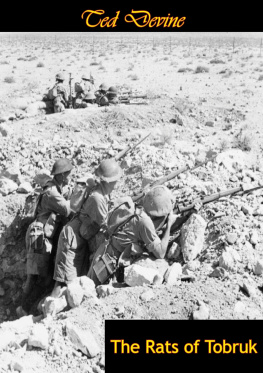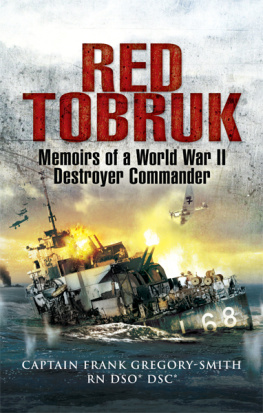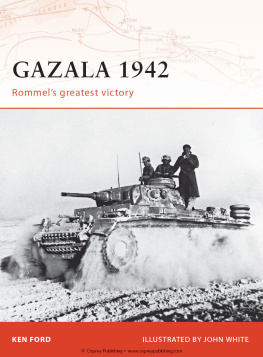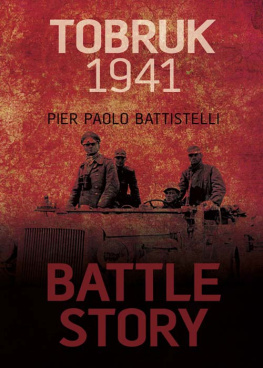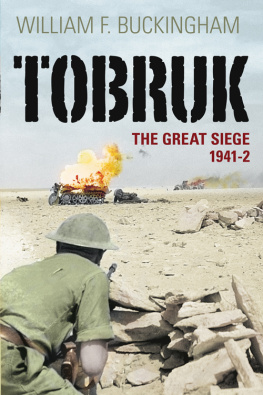TOBRUK
1942
ROMMEL AND THE
DEFEAT OF THE ALLIES
TOBRUK
1942
DAVID MITCHELHILL-GREEN

First published in 2016
The History Press
The Mill, Brimscombe Port
Stroud, Gloucestershire, GL5 2QG
www.thehistorypress.co.uk
This ebook edition first published in 2016
All rights reserved
David Mitchelhill-Green, 2016
The right of David Mitchelhill-Green to be identified as the Author of this work has been asserted in accordance with the Copyright, Designs and Patents Act 1988.
This ebook is copyright material and must not be copied, reproduced, transferred, distributed, leased, licensed or publicly performed or used in any way except as specifically permitted in writing by the publishers, as allowed under the terms and conditions under which it was purchased or as strictly permitted by applicable copyright law. Any unauthorised distribution or use of this text may be a direct infringement of the authors and publishers rights, and those responsible may be liable in law accordingly.
978 0 7509 6960 4
Original typesetting by The History Press
eBook converted by Geethik Technologies
CONTENTS
With banded backs against the wall,
Fiercely stand, or fighting fall.
The Siege of Corinth, Lord Byron, 1816
***
Millions of tongues record thee, and anew
Their childrens lips shall echo them, and say
Here, where the sword united nations drew,
Our countrymen were warring on that day!
And this is much, and all which will not pass away.
Childe Harolds Pilgrimage, Lord Byron, 1818
ACKNOWLEDGEMENTS
Work on this book has spanned several years. Many veterans, their families and relatives generously offered me a host of materials during the early stages of my research. I would like to thank (in no particular order): Richard Weston, Peter Rymer, May Green, Eric Watts, Dorothy Gibbs, A.R. Duckworth, Jack Holdsworth, Bert Thwaites, Bill Harvey, Harold E. Gibbs, Joy Ogley, Gloria Tonta, Rob Sangster, Jack Caple, Joyce and Ken James, Lloyd Tan, Betty Smith, Clare H. Walker, Roy Jardine, Olga Henwood, Margaret Donaghy, Ross Scholes, Dulcie Bowditch, Noel Shaw, Jack Caple, G.J. Tyler, Kerry Duce, John Best, T.H. Anderson, F.M. Paget, Meryll Williams, Joan Mawson, Jim Tattersall, Keith G. Secombe, Sylvia Sutcliffe, Joe Madeley, Gordon Hughes, A.C. Fletcher, M.D. Burles, Sue Lasky, H. Wilson, L.L. Barton, J.H. Flak, Janice Auburn and Murray Welton, Heinz Kilanowski, Rolf Werner Volker, Kurt Sawall, and Heinz Becker.
My heartfelt appreciation is also extended to Professor Mesut Uyar who kindly provided materials relating to the first battles for Tobruk from the Turkish perspective; to Carrie White-Parrish for critiquing the manuscript; and to Michael Leventhal and Chrissy McMorris for their enthusiasm in bringing this project to life. Errors of omission, fact or judgement are mine alone.
Finally, I would also like to acknowledge my familys longstanding support and understanding. Thank you Jennifer, Harvey and Hana.
ABBREVIATIONS
ADC | Aide-de-Camp |
AIF | Australian Imperial Force |
AWM | Australian War Memorial |
BEF | British Expeditionary Force |
BBC | British Broadcasting Corporation |
CIGS | Chief of the Imperial General Staff |
CRA | Commander of the Royal Artillery |
DAK | Deutsches Afrikakorps (German Africa Corps) |
Div | Division |
GOC | General Officer Commanding |
GHQ | General Headquarters |
HQ | Headquarters |
OKW | Oberkommando der Wehrmacht (High Command of the German Armed Forces) |
RA | Royal Artillery |
RAF | Royal Air Force |
RHA | Royal Horse Artillery |
RAN | Royal Australian Navy |
RASC | Royal Army Service Corps |
RN | Royal Navy |
RVNR | Royal Volunteer Naval Reserve |
RTR | Royal Tank Regiment |
SAAF | South African Air Force |
SAI | South African Infantry |
PREFACE
European interest in North Africa began with Napoleons ill-fated expedition to Egypt in 1798. It marked the beginning of an imperial crusade that would continue over the next 150 years. Frances next move was to seize Algiers in 1830. Tunisia and southern Morocco subsequently became French protectorates in 1881 and 1912 respectively. Britain followed suite, assuming control of the Suez Canal in 1875 and occupying Egypt in 1882. The Spanish occupied the Moroccan Atlantic coast (Ifni) in 1860, the Western Sahara in 1884 and northern Morocco in 1912. Our story begins around this period when Italy entered Libya. It continues on to the Italian invasion of Egypt in 1940 and the subsequent battles for control of the Middle East in the course of the worlds bloodiest war in history.
Benito Mussolinis march on Egypt endangered the security of the Suez Canal and the Middle East oilfields fuelling Britains war effort. The ensuing war in North Africa evolved in an uncharacteristic way. Arid swatches of empty desert offered no opportunity for terrain-related defence. Instead they became an ocean for Europes mechanised armies to manoeuvre across. In naval-like engagements, a position could change rapidly, stagnation spelt danger; lonely coastal ports along the northern Mediterranean became indispensable supply points. In the pages that follow, we will examine why the remote Libyan fortress and harbour town of Tobruk holds a special place in the history of the Second World War how it became a focal point in the Desert War, the objective of Axis and Allied offensives and a battleground that has since become the stuff of legend.
First occupied by the Italians in 1911, Tobruk was overrun by the British after a brief siege in January 1941. Soon afterwards in April 1941, a mixed British Commonwealth force was forced to retire into Tobruk in the face of an Axis advance led by the daring German commander, General Erwin Rommel, who had arrived in Libya to buttress the flagging Italians. The ensuing 9-month siege the longest in British military history catapulted Tobruk from obscurity to headlines around the world, a cause clbre. It was, like the Battle of Britain, a bright note for the Allies in the aftermath of a string of defeats across Western Europe by Hitlers Wehrmacht and the Dunkirk evacuation. It was also the albatross that thwarted Rommels unauthorised and audacious plan to seize Cairo.
In June 1942, Rommel again pressed forward and threatened Tobruk. However, many of the players in this desert drama had changed over the preceding months, as had the stage. Tobruk bore little resemblance to the bastion it was during the height of the second siege of 1941. Nevertheless, its reputation from that period remained influencing the fateful decision to hold it again, despite a directive at the beginning of 1942 that forbade another siege. The upshot of this decision led to one of the worst British defeats of the war, the repercussions of which were felt around the globe.


